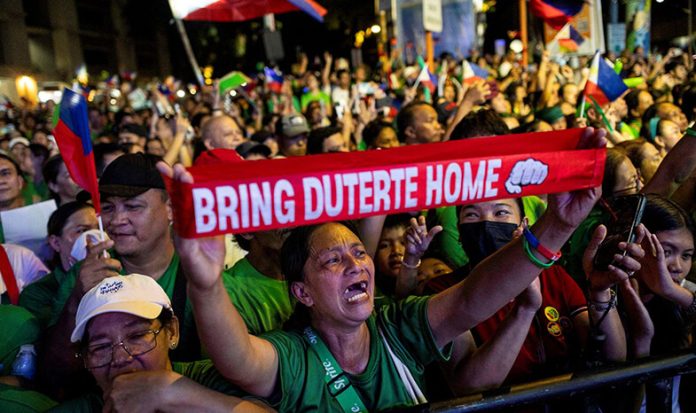Davao City, Philippines – May 14, 2025 — In an unprecedented political comeback, former Philippine President Rodrigo Duterte has secured a landslide victory in Davao City’s mayoral race, reclaiming his old post even while currently detained pending investigation over alleged human rights violations during his presidential term.
The Commission on Elections (COMELEC) confirmed Duterte’s win late Tuesday night, declaring that the 79-year-old political veteran obtained over 80% of the vote against three local challengers. His daughter and former Vice President Sara Duterte was seen at the city canvassing center during the proclamation, representing her father who remains under government custody.
Despite his controversial standing and legal entanglements, Duterte’s stronghold over Davao City politics appears unwavering. Supporters celebrated across key districts of the city, waving flags and chanting the familiar “Tapang at Malasakit” (Courage and Compassion) slogan that defined his administration. The outcome has sparked fresh debates over political dynasties, electoral laws, and the country’s justice system.
A Familiar Face Returns
Before ascending to the presidency in 2016, Duterte served as Davao City’s mayor for over two decades. His iron-fisted leadership and tough-on-crime approach earned both praise and criticism, yet he remained immensely popular in his hometown.
Though constitutionally barred from seeking re-election as president in 2022, Duterte never completely withdrew from politics. His latest campaign for mayor was announced just weeks before the deadline for local candidacies last year, stunning both critics and supporters. Legal experts questioned whether someone in detention could run for public office, but COMELEC ruled that there was no standing conviction that would disqualify him.
Duterte’s detention stems from ongoing proceedings at the Department of Justice and international investigations regarding alleged extrajudicial killings linked to his administration’s war on drugs. He has denied all allegations, calling them “politically motivated.”
Still, the arrest did not seem to dampen voter confidence.
Landslide Despite Legal Limbo
Election analysts expressed surprise at the margin of Duterte’s win. According to Pulse Mindanao, an independent research firm, voter turnout in Davao City reached 68%, with many casting their ballots early in favor of the former leader.
“He’s always been our mayor, no matter what position he holds in Manila,” said 54-year-old tricycle driver Leonardo Cruz. “He cleaned up our streets, brought in investors, and protected our families. We don’t care if he’s in detention—he deserves our vote.”
Even as the opposition raised questions about the fairness of the electoral process, Duterte’s legal team maintained that his candidacy was fully compliant with all regulations. Atty. Melchor Vasquez, a spokesperson for the Duterte camp, said the former president plans to fulfill his duties through a legal team and possibly seek house arrest to allow remote governance.
“There is no law preventing a detainee from holding public office unless convicted of a crime involving moral turpitude,” Vasquez noted. “Mayor Duterte will serve his constituents with the same passion he always has.”
Mixed Reactions from Political Circles
The announcement has elicited mixed reactions from national leaders. Malacañang issued a reserved statement congratulating all local officials who won, including Duterte, without directly addressing his legal situation.
In contrast, Senator Risa Hontiveros voiced concern over the implications of his win. “This development is troubling,” she said. “We must consider what it means for accountability and the message it sends about justice in our country.”
International human rights groups also weighed in. Amnesty International issued a statement urging the Philippine government not to let political wins interfere with due process. “Winning a local seat does not absolve a person of accountability for serious allegations. Justice must proceed,” the group said.
Meanwhile, supporters of Duterte across the country celebrated his comeback as a triumph over what they see as unfair international pressure. Online, hashtags like #BalikAlkalde (Return of the Mayor) and #DutertePaRin (Still Duterte) trended throughout election day.
Questions About Governance from Custody
One of the central issues now facing Davao City is how Duterte will govern while being held in detention. Local government experts say the situation is virtually unprecedented and may pose legal and logistical challenges.
“There’s very limited precedent for this,” said Professor Ruel Caralde of the University of the Philippines’ School of Government. “We may see legal battles in the coming weeks to define the scope of a detained official’s powers.”
Under the Local Government Code, a mayor may designate an officer-in-charge in cases of temporary absence, but it remains unclear how this applies when the mayor cannot physically perform duties due to detention. If unable to serve, Vice Mayor-elect Carolina Belmonte may act as de facto mayor in the interim.
Sara Duterte, the former mayor herself and now retired from national office, hinted that the family is exploring legal remedies to allow her father to serve in some capacity, possibly from a secure facility in Davao.
A Defiant Message
In a pre-recorded message aired shortly after his victory was announced, Duterte thanked his constituents and vowed to continue fighting for the city.
“I may be in detention, but I am not silenced,” he said. “You have given me your trust again, and I will not let you down. Davao is my home. I will serve you for as long as I live.”
Observers note that Duterte’s continued popularity in Davao could embolden other political figures facing legal scrutiny to attempt comebacks at the local level. His return to city hall—at least symbolically—may also influence the broader dynamics of national politics, particularly as the 2028 presidential election draws nearer.
Looking Ahead
While the legal battles surrounding Duterte are far from over, his mayoral victory underscores a central theme in Philippine politics: the enduring power of local loyalty, even in the face of national controversy.
Political watchers say that the next few months will test the boundaries of local governance laws and institutional independence. Will Duterte be allowed to govern remotely? Will his detention escalate into a full-blown constitutional crisis?
For now, though, the people of Davao have spoken, and they want their longtime mayor back—regardless of the legal storm surrounding him.
